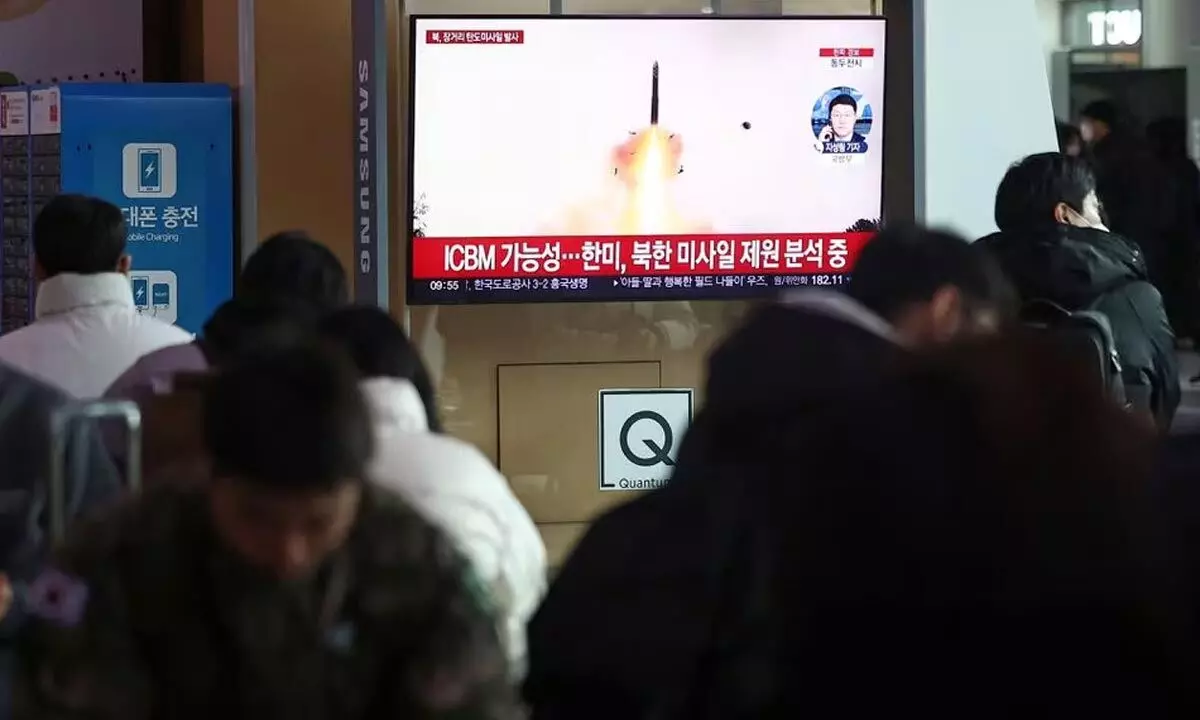North Korea fires ICBM after condemning US 'war' moves
Share :

- ICBM has range of more than 15,000 km -Japan official
- Missile fired from near Pyongyang, flew about 1,000 km -Seoul
- North Korea's second missile launch in matter of hours
SEOUL/TOKYO: North Korea fired an intercontinental ballistic missile on Monday that has a range to hit anywhere in the United States, said South Korea and Japan, marking its second launch in hours as Pyongyang condemned a U.S.-led show of force as "war" moves.
The missile has a potential to travel more than 15,000 km (9,300 miles), meaning it can reach anywhere in Japan and the mainland United States, Japan's Parliamentary Vice Minister of Defense Shingo Miyake said.
South Korea's National Security Council said it was a solid-fuel intercontinental ballistic missile (ICBM), labelling the launch a destabilising act that ignored international warnings and multiple U.N. Security Council resolutions.
President Yoon Suk Yeol had ordered the upgrading of the effective operation of "nuclear deterrence" by South Korea and the United States, it added.
Coinciding with the North's fifth ICBM launch of the year, China and North Korea held a high-level meeting in Beijing on Monday. Beijing, which is Pyongyang's closest ally, reaffirmed a commitment to deepen cooperation and said discussions covered issues of "common concern", without elaborating.
As a permanent member of the U.N. Security Council, China supported all resolutions imposing sanctions on the North up to 2017 for its weapons development, but has since refused to back further sanctions saying these would only raise tensions.
Monday's missile was fired from an area near the capital Pyongyang towards the sea off the North's east coast and flew about 1,000 km, South Korea's Joint Chiefs of Staff said.
Japan's defence ministry reported the flight lasted 73 minutes, just short of the 74 minute flight by an ICBM North Korea fired in July. It reached a maximum altitude of more than 6,000 km and fell into the sea west of Hokkaido outside Japan's exclusive economic zone, Japan said.
The area near the international airport serving Pyongyang is where the North previously launched ICBMs and is suspected to be the location of a missile assembly facility.
The North's latest, solid-fuel Hwasong-18 ICBMs have been launched from near Pyongyang, at a grass field that analysts said is likely reinforced with concrete for the heavy launch vehicle.
Monday's missile launch came after North Korea fired a short-range ballistic missile on Sunday night, flying about 570 km and falling into the ocean.
North Korea followed up that launch with a fiery statement condemning the United States for orchestrating what it called a "preview of a nuclear war," including the arrival of a nuclear-powered submarine in South Korea on Sunday.
U.S SUBMARINE VISITS SOUTH KOREA
White House National Security Adviser Jake Sullivan spoke with his South Korean and Japanese counterparts and stressed the importance of sharing missile warning data, the White House said.
South Korea's presidential office also said the officials discussed working closer to stop the North's illicit cyber activities and illegal foreign businesses.
The allies have been working to set up a real-time missile data sharing system, but it is still "a few days" from going operational, South Korea's defence ministry said.
On Friday, following a high-level meeting by U.S. and South Korean officials on the use of U.S. strategic military weapons to deter North Korea's military threat, Washington warned any nuclear attack would lead to the end of the regime.
North Korea says it has a sovereign right to operate a ballistic missile program for self defence and rejects a Security Council ban, which it says is a product of hostile U.S. policy.
After Sunday's launch, North Korea's defence ministry criticised "military gangsters" in the United States and South Korea for raising tensions with drills, displays of force, and nuclear war planning.
The statement by an unnamed ministry spokesman cited the arrival of the U.S. nuclear-powered submarine Missouri in the South Korean city of Busan on Sunday.
Visits by U.S. nuclear submarines had previously been rare, but they have increased under agreements between Seoul and Washington that have boosted arrivals of U.S. military assets.
The USS Carl Vinson, a U.S. aircraft carrier, also visited Busan last month as part of an effort to increase deterrence against North Korea's nuclear and missile programs.
The North's defence ministry also condemned the meeting by South Korean and U.S. officials in Washington as another sign of efforts to streamline war preparations and a provocative show of force.
The United States and South Korea have increased the intensity of joint military drills against rising threats from the North, which had tested a range of ballistic missiles and in November launched its first military spy satellite.







